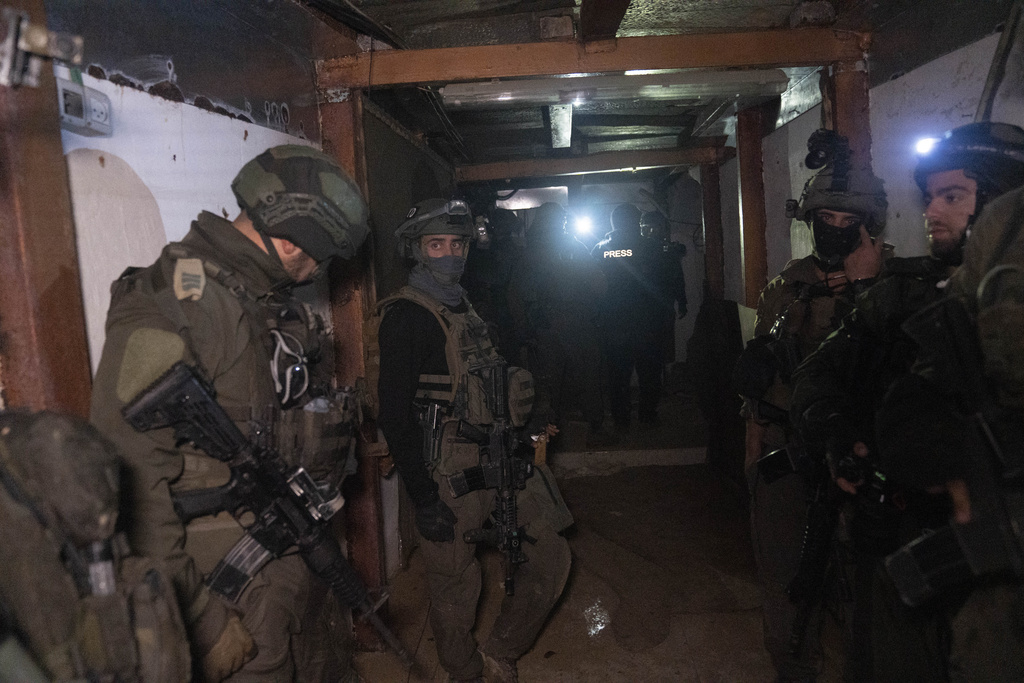President Joe Biden continues to support Israel’s war against Hamas, but as the war drags on, daylight has emerged between him and Prime Minister Benjamin Netanyahu.
Biden, long the Israel backer throughout his political career, has repeatedly affirmed U.S. support for Israel’s right to defend itself and go after Hamas in the aftermath of the Oct. 7 terrorist attacks that left roughly 1,200 people dead.
Israel’s latest war aims are to continue their operations in the southern Gaza city of Rafah, where more than 1 million Palestinians have fled at the insistence of the Israeli military. Israeli leaders have said they are evaluating how to evacuate the Palestinian civilian population in Rafah, though their intention remains unclear, despite global concerns about the grave possibility of a significant number of civilian deaths.
The United States does not support an Israeli wide-scale operation in Rafah without significant planning for the civilians, while Israeli leaders have maintained that they have to carry out operations in Rafah to complete its goals of eliminating Hamas, given it’s the last remaining part of the strip they haven’t operated in.
“I’ve made the case and I feel very strongly about it that there has to be a temporary ceasefire to get the prisoners out, the hostages out, and that is still underway,” Biden said on Friday. “I’m hopeful that can be done, and in the meantime I don’t anticipate, I’m hoping that the Israelis will not make any massive land invasion in the meantime. So it’s my expectation that does not happen.”
The U.S. president recently admonished Israel’s actions in Gaza as “over the top,” despite Israel’s insistence that they are trying to limit civilian deaths, even as urban warfare is known for high casualty counts.
Biden, however, still supports their overall war aims of removing Hamas from power in the strip, a goal that Israeli leaders argue has not been accomplished yet and would go unfulfilled if they don’t operate in the southern Gaza city of Rafah.
Hamas has gone to significant lengths to embed itself within and underneath the Palestinian civilian communities with a web of tunnels, making Israel’s efforts to prevent civilian casualties even more difficult. Israel has carried out complex operations at various hospitals in Gaza, in which Hamas was using the protected facilities for war purposes.
“POTUS strongly supports Israel’s right to defend itself from Hamas. We also have said that the way they do so matters. Not an inherent contradiction,” an NSC spokesperson told the Washington Examiner, adding that they “recognize it’s a challenge” when Hamas is hiding among large and protected civilian populations like at hospitals and schools.

Despite Hamas’s attempts to incur civilian casualties by the Israeli forces, the U.S. believes that does not absolve Israel’s responsibility for defending those civilians.
More than 27,000 people have been killed in the war, according to the Hamas-controlled Gaza Health Ministry, though that total does not distinguish between civilians and combatants.
“I think we’ve responded in a way that goes after the terrorists and tries to minimize the civilian population in which the terrorists embed themselves and use them as human shields,” Netanyahu said last week. “I’d be cautious with the Hamas statistics, and I can tell you that according to these urban warfare experts and other commentators, we’ve brought down the civilian-to-terrorist casualty, the ratio down, to below 1-to-1, which is considerably less than in any other theater of similar warfare.”
Netanyahu did not provide proof to support his claim that they are now killing more terrorists than civilians, but it demonstrates the difficulty of the task of going after a group that is intentionally hiding among and often directly below civilians.
John Spencer, chairman of urban warfare studies at the Modern War Institute at West Point, argued last month that “Israel has implemented more measure to prevent civilian casualties in urban warfare than any other military in the history of war,” and referenced Israel’s communications with Palestinians ahead of strikes via phone or roof-knocking and evacuations, and the decision to delay its initial fighting in northern Gaza.
Vice President Kamala Harris met with Israeli President Isaac Herzog on Friday, and according to a readout of their meeting, she reiterated the “administration’s position that a military operation in Rafah should not proceed without a credible and executable plan for ensuring the safety of and support for the more than 1 million people sheltering there.”
CLICK HERE TO READ MORE FROM THE WASHINGTON EXAMINER
As concerns about Rafah mount, the U.S. continues to push for a temporary ceasefire to secure the release of the Israeli hostages held since the Oct. 7 attacks, in addition to looking ahead to what comes after the war ends. There are believed to be about 130 people still held hostage, though it’s unclear whether they are still alive.
Biden remains committed to getting Israel and Hamas to agree to a temporary ceasefire that would include the release of the hostages, including six Americans, in exchange for a cessation of the war and the increase of humanitarian aid into the strip.
